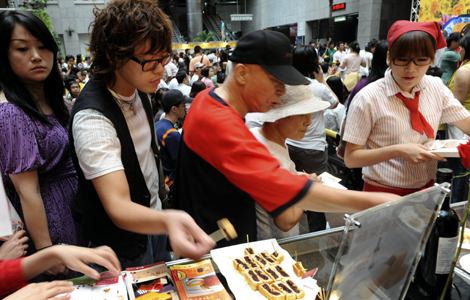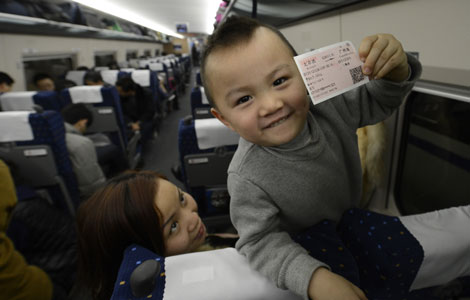New subway routes open to public
Updated: 2012-12-31 03:45
By Jin Haixing (China Daily)
|
||||||||
Beijing opened a new subway line and extensions of three others on Sunday, marking a step forward in the capital's efforts to expand its rail transit system to ease severe traffic congestion.
The new line and sections — Line 6 and extensions of lines 8, 9 and 10 — began operating early on Sunday and 698 trains had traveled on them by noon that day, Beijing Subway Company, which operates the lines, said on its website.
The Beijing subway now has 442 kilometers of lines, making it the longest in China.
The first train began to run on Line 6 at 5:15 am on Sunday, starting its journey from Caofang Station in the eastern part of the city.
One white-collar worker surnamed Huang said he was pleased with the new service after taking a Line 6 train from the Qingnianlu Station, toward the eastern part of the line, to the Hujialou Station, where he transferred to Line 10.
"It took only about 8 minutes to go three stations, which was really fast," Huang said.
Huang said the trains on Line 6 are more comfortable and longer than those on the older lines.
The new eight-carriage trains that travel on the line can carry nearly 2,000 passengers at a time, the Beijing Youth Daily reported.
A subway worker surnamed Li who works at Cishousi Station, a station on both lines 6 and 10, said she and her colleagues had prepared for two months for the official opening on Sunday. Every station has six to seven workers who take tickets, maintain security and direct traffic.
Technicians were under huge pressure to conduct signal experiments before the extended section of Line 10 began operating.
The signal experiments were not allowed to interrupt the operation of older sections of the line, a requirement that made the preparation work very difficult, said Zhang Yanbing, a senior engineer at the equipment department of Beijing MTR Construction Administration Corp, which built the new line and extensions. Most of the tests were conducted at night, Zhang said.
With the completion of two other stations in mid-2013, Line 10 will become Beijing's second subway loop line and the longest line in the city.
Li Dongsheng, a retiree who lives in the city's Tongzhou district, said he made a special trip on Sunday on Line 6 from Caoqiao Station to Nanluoguxiang Station, a journey that took him 30 minutes.
The design and decoration of Nanluoguxiang Station were meant to be reminiscent of old Beijing, Li said. He said the rapid development of Beijing's subway system is impressive and he hopes the government can accelerate the extension of Line 6 to Tongzhou district.
He said many expect Line 6 to help relieve the traffic burden on Line 1, the city's oldest subway route.
Jia Miao, an employee at Chedaogou Station and a former social worker who had helped disabled people, said Line 10 employees have received training in providing services to the disabled.
Disabled passengers can use elevators to enter the station and will be accompanied by subway employees at every station until they reach their destinations, Jia said.
However, tests on the elevators along Line 10 are still to be completed, according to the subway operator.
Also being introduced on the new lines are connections between the subway and other means of transport.
Places where bicycles can be parked, for instance, were set up at every station along the extension of Line 10.
Also on Sunday, 17 new bus lines began operating and six lines were adjusted to connect with the new subway lines, according to the Beijing Municipal Commission of Transport.
Jia Yuanyuan, 33, who lives in the Shijicheng community in western Beijing, said she welcomed the new bus lines. She said the connections will make it convenient to transfer to the subway.
Beijing plans to put at least one new subway line into operation each year from 2013 to 2015, according to Beijing Subway Company.
By 2015, the number of subway lines in Beijing will reach 19, and they will have a combined length of 561 kilometers. By 2020, the subway is expected to increase to 1,000 km in length.
People used Beijing's public transportation system to make an average of 20.6 million trips a day in 2012. About 44 percent of Beijing residents say they use public transport, the highest percentage among all cities in the country.
Contact the writer at jinhaixing@chinadaily.com.cn











